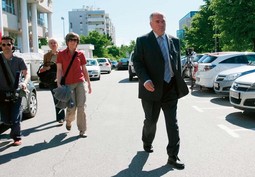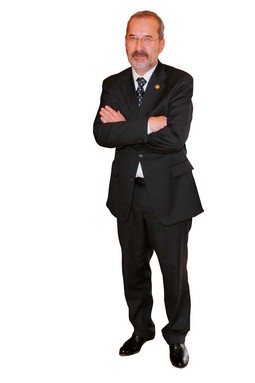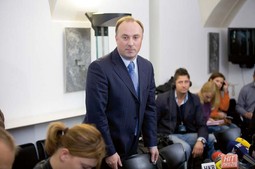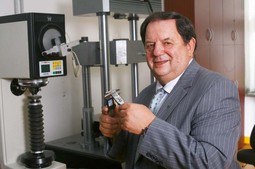Published in Nacional number 756, 2010-05-11
BACKGROUND to the HEP scandal
Electric circuit surrounds Sanader
THE ARREST OF IVAN MRAVAK has provoked an unexpected reaction from Damir Polancec: from police detention he has for the first time, through his attorney, accused top Government officials and the HDZ leadership of malversation
 IVAN MRAVAK The arrest of the former HEP CEO is probably just the first step in the efforts of the State Attorney's Office to entirely dismantle the Sanader octopusBy opening the HEP scandal, Government and the State Attorney's Office are tightening the noose around former Prime Minister Ivo Sanader, whom many have for months now linked to a number of corruption cases already known to the public at large. According to some sources, there is no more doubt that Sanader will very soon be called in for questioning by USKOK (Office for the Prevention of Corruption and Organized Crime), where he will have to explain his complicity or at least offer coherent explanations for some of the cases of corruption in which his name is very significantly mentioned.
IVAN MRAVAK The arrest of the former HEP CEO is probably just the first step in the efforts of the State Attorney's Office to entirely dismantle the Sanader octopusBy opening the HEP scandal, Government and the State Attorney's Office are tightening the noose around former Prime Minister Ivo Sanader, whom many have for months now linked to a number of corruption cases already known to the public at large. According to some sources, there is no more doubt that Sanader will very soon be called in for questioning by USKOK (Office for the Prevention of Corruption and Organized Crime), where he will have to explain his complicity or at least offer coherent explanations for some of the cases of corruption in which his name is very significantly mentioned.
The latest arrest - that of former Croatian electric power authority HEP CEO Ivan Mravak - will by all accounts be key to Sanader's fate, and there are several facts that are indicative of this. First of all, this is the financially most serious case, as the damage to the Croatian national budget is measured in the hundreds of millions of kuna. Based on the first information, the initial amount of the damage exceeds 600 million kuna, but some sources put the figure even higher. On the other hand, broaching the HEP scandal demonstrates the decisive intent of the Croatian authorities and judicial institutions to entirely unveil and dismantle the Sanader octopus - a complex system of parallel lines of government and running the country that saw Croatian budget funds for years intentionally and unreasonably siphoned off to the pockets of various individuals. The key task currently facing police and USKOK investigators is to establish the concrete motives and benefit that all of the actors had from these activities - including the most responsible person in the executive branch of government.
That the HEP case will evidently be the breaking point in Sanader's position was demonstrated by last week's arrest of Ivan Mravak, which provoked an entirely unexpected reaction from former Deputy Prime Minister Damir Polancec. He has been in police detention in Remetinec Prison for some time now in the Podravka case, but his name has also surfaced in the investigation into HEP. It was not the first time he has been brought into connection with criminal activities - he was under fire from many corners last year ahead of his forced departure from Government, during the time his friends from the Podravka management were being arrested, and finally when he was himself arrested at his home in Koprivnica.
At each of these junctures Polancec in his public appearances let it be known that he would stoically face the accusations levelled against him, but that he could also, if his patience wore thin, have much to say. And that is just what happened late last week. On Friday Polancec sent a very significant message by way of his attorney Nobilo to the Croatian public at large, and to his, until recently, colleagues in Government and the HDZ (Croatian Democratic Union) - "If I am guilty, top Government officials and the HDZ are also guilty." With this statement from his detention prison cell Polancec cut short several months of silence and sent a warning that, evidently under certain circumstances, he was willing to finger his former superior - Ivo Sanader.
 HDZ WISH LIST The leadership of the ruling party would like Bajic to arrest Sanader ahead of the elections for Parliament - they believe the move would earn them many votesIf that was to happen it is quite clear now that USKOK, the State Attorney's Office and the police would not hesitate for a moment to arrest Sanader himself and send him off to Remetinec Prison, which would be a watershed moment in recent Croatian political history. Ever since he stepped down from the post of Prime Minister in July of last year, his name has directly or indirectly been brought into connection with a number of major cases of corruption. In late October of last year Nacional cited the Podravka, Brodosplit, military lorry, HEP and Croatian Motorways scandals as the biggest cases connected to Sanader, and of late an investigation has been underway into his complicity in the case of the Fimi-media company, where tens of million of kuna from the national budget wound up in the company owned by Nevenka Jurak, a close friend of the head of the Custom's Administration Mladen Barisic. There was frequent speculation late last year of the possibility that the chief suspects in some of these scandals could finger Sanader as the principal, which would open the way to investigators for the criminal persecution of the former Prime Minister. Sanader was himself well aware of this and he pressured many within the HDZ to stop the investigations that could end up at his doorstep. From the present perspective the reasons that led Sanader on 22 October 2009, after avoiding the public for three months, to make an unexpected appearance at a session of the HDZ presidency are much clearer. He made a vehement appeal to his former party colleagues then to defend Damir Polancec, and concluded his statement vividly, saying "They want to skewer us on a spit and turn us over the fire."
HDZ WISH LIST The leadership of the ruling party would like Bajic to arrest Sanader ahead of the elections for Parliament - they believe the move would earn them many votesIf that was to happen it is quite clear now that USKOK, the State Attorney's Office and the police would not hesitate for a moment to arrest Sanader himself and send him off to Remetinec Prison, which would be a watershed moment in recent Croatian political history. Ever since he stepped down from the post of Prime Minister in July of last year, his name has directly or indirectly been brought into connection with a number of major cases of corruption. In late October of last year Nacional cited the Podravka, Brodosplit, military lorry, HEP and Croatian Motorways scandals as the biggest cases connected to Sanader, and of late an investigation has been underway into his complicity in the case of the Fimi-media company, where tens of million of kuna from the national budget wound up in the company owned by Nevenka Jurak, a close friend of the head of the Custom's Administration Mladen Barisic. There was frequent speculation late last year of the possibility that the chief suspects in some of these scandals could finger Sanader as the principal, which would open the way to investigators for the criminal persecution of the former Prime Minister. Sanader was himself well aware of this and he pressured many within the HDZ to stop the investigations that could end up at his doorstep. From the present perspective the reasons that led Sanader on 22 October 2009, after avoiding the public for three months, to make an unexpected appearance at a session of the HDZ presidency are much clearer. He made a vehement appeal to his former party colleagues then to defend Damir Polancec, and concluded his statement vividly, saying "They want to skewer us on a spit and turn us over the fire."
There have been significant changes in Croatia since then. Prime Minister Jadranka Kosor, Chief State Attorney Mladen Bajic, USKOK director Dinko Cvitan and Interior Minister Tomislav Karamarko have demonstrated in a number of cases that the showdown with corruption will be more than just a paper tiger, something the high-ranking Croatian politicians and businesspeople that have spent months in police detention at Remetinec Prison have become aware of. And in a country hit by the financial crisis citizens have become sensitive to every form of corruption that results in the illegal accumulation of wealth by individuals to the detriment of the national budget, something all leading Croatian politicians have become conscious of. And as defending Damir Polancec was the farthest thing from the minds of all prominent members of Government and the HDZ these past months, so too has their former chief party finance officer Mladen Barisic found himself quite alone these past days. Sanader, whose power and influence has rapidly eroded these past months, can expect a similar reaction.
 DAMIR POLANCEC, the former Deputy Prime Minister, has cut short his many months of silenceAnd while Polancec did not explicitly mention Sanader in his message from police detention, it is quite clear that in citing the "national leadership" and "Government's inner cabinet" the former Deputy Prime Minister was thinking of him precisely. The inner cabinet of the Sanader Government, besides the Prime Minister himself, included the Deputy Prime Ministers - besides Polancec this included Jadranka Kosor, Durda Adlesic and Slobodan Uzelac. When it came to HEP, it is quite clear that even within the inner cabinet the key decisions on electric energy could only have been made by Sanader and Polancec because, truth be told, the other deputy prime ministers probably knew nothing of this complex portfolio or, in the worst case, without access to concrete information, went along with the opinions served to them by the Sanader-Polancec tandem. Besides, they installed people loyal to them and who answered to them alone at strategic posts in the energy sector. Former HEP boss Ivan Mravak was a person of Sanader's confidence, while Tomo Galic, the head of the Croatian Energy Regulatory Agency (HERA), is a long time close friend of Polancec's. For a time Sanader had additional indirect influence on HEP - for two years Ante Despot, the son-in-law of Sanader's friend Mladen Barisic, sat on the board of HEP.
DAMIR POLANCEC, the former Deputy Prime Minister, has cut short his many months of silenceAnd while Polancec did not explicitly mention Sanader in his message from police detention, it is quite clear that in citing the "national leadership" and "Government's inner cabinet" the former Deputy Prime Minister was thinking of him precisely. The inner cabinet of the Sanader Government, besides the Prime Minister himself, included the Deputy Prime Ministers - besides Polancec this included Jadranka Kosor, Durda Adlesic and Slobodan Uzelac. When it came to HEP, it is quite clear that even within the inner cabinet the key decisions on electric energy could only have been made by Sanader and Polancec because, truth be told, the other deputy prime ministers probably knew nothing of this complex portfolio or, in the worst case, without access to concrete information, went along with the opinions served to them by the Sanader-Polancec tandem. Besides, they installed people loyal to them and who answered to them alone at strategic posts in the energy sector. Former HEP boss Ivan Mravak was a person of Sanader's confidence, while Tomo Galic, the head of the Croatian Energy Regulatory Agency (HERA), is a long time close friend of Polancec's. For a time Sanader had additional indirect influence on HEP - for two years Ante Despot, the son-in-law of Sanader's friend Mladen Barisic, sat on the board of HEP.
As a result it appears that his stay at Remetinec Prison has had a strong influence on Polancec, who has become aware that, besides the Spice scandal, he has also of late been brought into connection with the HEP scandal and that, while he is behind bars, his former boss is still a free man. If, in return for eventually turning state's witness, Polancec decides to speak out officially about the role played by the former Croatian Prime Minister, this could without a doubt affect Sanader's position. And that could have other far-reaching consequences. Polancec probably knows something of some other, perhaps as yet unknown suspicious cases that incriminate Sanader, and if Polancec were to turn state's witness it could have an effect on other people who have not yet incriminated Sanader. In the case of HEP it could be Ivan Mravak, and it is not ruled out that at some point in time Sanader's long-time friend Mladen Barisic could divulge something about Sanader to USKOK investigators. And even that is not the end of the list of possible state's witnesses, as former HPB bank boss Josip Protega could also have many interesting things to tell investigators.
The HEP scandal will probably take months to clear up, just like it took a very long time for USKOK and police investigators to establish all of the key facts in what is financially probably the biggest corruption case in Croatia. Many details that reveal the broad scope of the operation have been slowly uncovered over the past few days. It started back in April of 2007 with the suspicious privatisation of the TLM light metals factory in Sibenik. In spite of the evaluation of experts at the Croatian Privatisation Fun, a good foreign offer from the Lithuanian UBIG (Ukio Banko Investicine Group) was rejected, and TLM was sold to Adrial, a domestic consortium made up of Dalekovod, Konstruktor, Zagreb-Montaza, Feal and Alu Flex Pack. After the decision was announced the representatives of UBIG publicly declared that they had offered 187.5 million euro for TLM, while the domestic consortium offered 119 million, which gave them an advantage of 68 million euro. As an additional argument they stated that the domestic consortium purchased the tender documentation at the Croatian Privatisation Fund just three days ahead of the deadline for the tendering of bids, which is not enough time for a serious investor to prepare an offer, but certainly is if they had received a political rubber stamp before doing so from top Croatian officials.
 LUKA MILICIC, the CEO of Dalekovod, a member of the consortium USKOK is investigating over detrimental contracts concluded with Croatian Motorways and electric power authority HEPAnother aspect of the entire HEP scandal is the purchase of electricity abroad, i.e. contracts on the purchase of electric energy HEP concluded with EFT, Rudnap and Korlea. According to some estimates, HEP, by paying an unrealistically high price on the basis of these contracts, lost about 750 million kuna in the space of just one year. And while it had been expected for years, HEP never established its own middleman companies abroad, and purchased were rather contracted with Serbian energy broker Vuk Hamovic and his London-based company Energy Financing Team (ETF), with former Montenegrin minister Vojin Lazarevic and his company Rudnap and with the Ukrainian-Slovak company Korlea, represented in Croatia by Marko Cosic, the son of HDZ Member of Parliament Kresimir Cosic. It would be interesting to learn from the former head of HEP who made the decision to do business with Vuk Hamovic, against whom investigations and pre-investigation procedures have been led in Bosnia Herzegovina, Serbia, Great Britain and the USA. Back in 2003 the OHR auditor in Bosnia Herzegovina discovered that domestic electric energy companies had concluded contracts with Hamovic's ETF for the most part to the detriment of state-owned companies.
LUKA MILICIC, the CEO of Dalekovod, a member of the consortium USKOK is investigating over detrimental contracts concluded with Croatian Motorways and electric power authority HEPAnother aspect of the entire HEP scandal is the purchase of electricity abroad, i.e. contracts on the purchase of electric energy HEP concluded with EFT, Rudnap and Korlea. According to some estimates, HEP, by paying an unrealistically high price on the basis of these contracts, lost about 750 million kuna in the space of just one year. And while it had been expected for years, HEP never established its own middleman companies abroad, and purchased were rather contracted with Serbian energy broker Vuk Hamovic and his London-based company Energy Financing Team (ETF), with former Montenegrin minister Vojin Lazarevic and his company Rudnap and with the Ukrainian-Slovak company Korlea, represented in Croatia by Marko Cosic, the son of HDZ Member of Parliament Kresimir Cosic. It would be interesting to learn from the former head of HEP who made the decision to do business with Vuk Hamovic, against whom investigations and pre-investigation procedures have been led in Bosnia Herzegovina, Serbia, Great Britain and the USA. Back in 2003 the OHR auditor in Bosnia Herzegovina discovered that domestic electric energy companies had concluded contracts with Hamovic's ETF for the most part to the detriment of state-owned companies.
The third aspect of the investigation into HEP pertains to the contracts on the basis of which HEP sold electric energy to the Sibenik-based TLM light metals factory and to Mostar-based aluminium producer Aluminij at four times under procurement prices. TLM used only 7 percent of the electricity purchased from HEP at this privileged price for its own production needs. The other 93 percent was passed on to the Aluminij factory in Mostar.
The motives for concluding these kinds of detrimental contracts are under particular scrutiny in the investigation, because HEP sold TLM electricity under cost, and TLM was purchased by a consortium of Croatian companies including Dalekovod, Konstruktor, Zagreb-Montaza, Alu Flex Pack and Feal of Siroki Brijeg. The sum of 600 million kuna in damages suffered by HEP as a result of the detrimental contract with TLM for the most part wound up in the hands of the members of the Adrial consortium - and these are entirely privately-owned firms. For TLM to even sell electricity to Aluminij of Mostar it had to have received a licence to do so from the Croatian Energy Regulatory Agency, where for years the top man was Tomo Galic, a person of Damir Polancec's particular confidence.
For every aspect of the HEP scandal investigators will have to establish what the motives were for the detrimental decisions and who the responsible party was. By all accounts USKOK does not believe that a policy of assisting Croatians in Bosnia Herzegovina was behind it, as only a handful of people had any benefit from it all. As far as responsibility goes, USKOK's prime suspect Damir Polancec last week indirectly pointed the finger at "top Government officials and the HDZ leadership." And it is clear to everyone in Croatia to whom he was referring.
Related articles
Sanader’s eight fear SDP — Won’t bring down Government
Despite forecasts that he would, former Croatian Prime Minister Ivo Sanader, who recently took his seat in Parliament, will not work from the house… Više
Latest news
-
28.10.2010. / 14:15
'A profitable INA is in everyone's interest'
-
28.10.2010. / 09:38
Sanader’s eight fear SDP — Won’t bring down Government
-
21.10.2010. / 15:02
Interior Ministry turned a blind eye on Pukanic assassination
-
20.10.2010. / 09:34
Barisic could bankrupt HDZ




